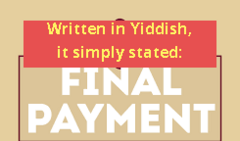Final Payment
07/03/2023 02:35:21 PM
Rabbi Eisenman
| Author | |
| Date Added | |
| Automatically create summary | |
| Summary |

The love of his life was learning Torah, yet, his learning was limited to Yiddish translations.
Every morning from 3 to 6, he would learn through his well-worn Yiddish copy of the Chayei Adam and the Beis Yehudah Chumash.
He would then head to Shul, ensuring he was first there.
His English was broken, so he was thrilled when he could talk in learning with someone in the Mama Lashon.
His name was Reb Yosef Packowitz, and he was born in Poland around 1886.
He physically arrived on these shores about 1920. However, spiritually, he continued to reside in the Shtetl.
He worked hard as a baker.
Yet, he refused to work on Shabbos.
After numerous times being fired, he finally landed a job where instead of Shabbos, he would work thirty-six hours straight from right after Shabbos until Monday morning.
No matter the cost, he would say, “I would give my life before working on Shabbos!”
Unfortunately, due to the dearth of yeshivas at the time, his children drifted from Torah observance and changed the family name to Parker.
When the name Packowitz was discarded, Torah and Mitzvohs were also forsaken.
Yet, Reb Yosef himself remained committed to Torah and was overjoyed when his granddaughter Elaine, born in 1932, married Herman Scherman and returned to a Torah lifestyle.
Elaine Scherman passed away last month, and at the Shiva, her son-in-law Rav Shmuel Geller related the following incident.
In 1978, Rav Shmuel, a Kollel man, married Elaine’s daughter Sarah.
Reb Yosef was overjoyed and immensely thankful to Hashem.
He was convinced his years of commitment to Shemiras Shabbos had paid off, as he was privileged to see his great-granddaughter wed to a true Ben Torah.
Reb Yosef would spend hours speaking in Torah with Rav Shmuel and delighted in sharing with him Vortlach in Yiddish.
One day, in early 1979, Reb Yosef offered his great-grandson Rav Shmuel a business partnership.
Reb Yosef said that as he has passed his 90th birthday, it’s time for him to prepare for his final journey.
He told Rav Shmuel that the greatest Zechus he could have in the next world was Limud HaTorah.
He requested that his great-grandson learn in his Zechus for the first year after his passing.
Rav Shmuel eagerly agreed.
However, Reb Yosef was not satisfied with just an oral agreement.
“I will pay you $100 if you learn in my Zechus. Do you agree?”
Rav Shmuel said he would do so without payment. Reb Yosef insisted on paying.
Reb Yosef withdrew a five-dollar bill from his wallet and said, “This is the first installment. I will pay you off throughout the year. I will pay you in full.”
Throughout 1979, Reb Yosef would continue the five-dollar payments whenever he saw Rav Shmuel.
When Reb Yosef gave the money, he would announce how much was left on his “debt.”
As December 1979 approached, Reb Yosef grew weaker. On Tuesday, December 4, the 14th of Kislev, Reb Yosef said Shema for the last time and peacefully departed this world.
At the Shiva, Rav Shmuel told about his “business deal” with his great-grandfather and how Reb Yosef was still twenty dollars “short” of his committed $100.
Everyone was saddened by the “debt” and thought, “If only Reb Yosef knew when his time would be.”
Shiva ended a few days before Chanukah.
When the family cleaned Reb Yosef’s room, they noticed he had carefully prepared envelopes for his einkelach marked with the words “Chanukah Gelt.”
As everyone opened their envelopes, they discovered a five-dollar bill.
That is except for one.
When Rav Shmuel Geller opened his envelope, out fell a twenty-dollar bill.
Rav Shmuel noticed a small note attached as he picked up the bill.
Written in Yiddish, it simply stated, “The final payment.”
Tue, November 4 2025
13 Cheshvan 5786
Today's Calendar
| Daf Yomi - Rabbi Jacobowitz : 9:00pm |
| Daf Hashavua Chaburah - Rabbi Yehudah Kovacs : 9:15pm |
Friday Night
| Candle Lighting : 4:27pm |
Shabbos Day
| Hilchos Shabbos - Rabbi Eisenman : 8:15am |
| Bein Adam L'Chaveiro - Rabbi Eisenman : 11:15am |
| Daf Yomi - Rabbi Jacobowitz : 2:40pm |
| Massechta Taanis - Rabbi Eisenman : 3:15pm |
| Sixth Perek of Brachos - Rabbi Wiederblank : 3:15pm |
| Mesillas Yesharim w. Shalosh Seudos - Rabbi Eisenman : 4:55pm |
Upcoming Programs & Events
Nov 19 Hafrashash Challah Event 2025 Wednesday, Nov 19 8:00pm |
This week's Torah portion is Parshas Vayera
| Shabbos, Nov 8 |
Candle Lighting
| Friday, Nov 7, 4:27pm |
Shabbos Mevarchim
| Shabbos, Nov 15 |
Important Links
Zmanim
| Alos Hashachar | 5:07am |
| Earliest Tallis | 5:35am |
| Netz (Sunrise) | 6:30am |
| Latest Shema | 9:05am |
| Zman Tefillah | 9:57am |
| Chatzos (Midday) | 11:40am |
| Mincha Gedola | 12:06pm |
| Mincha Ketana | 2:40pm |
| Plag HaMincha | 3:45pm |
| Shkiah (Sunset) | 4:49pm |
| Tzais Hakochavim | 5:32pm |
| More >> | |
Privacy Settings | Privacy Policy | Member Terms
©2025 All rights reserved. Find out more about ShulCloud


